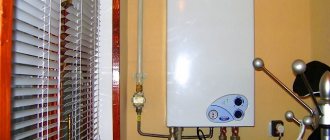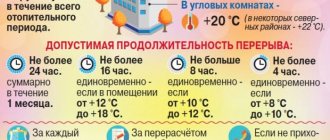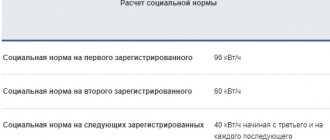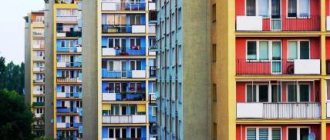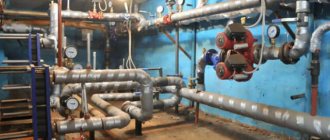With the arrival of autumn, the air outside and in apartments has become colder, so many are wondering when the heating will be turned on in 2021 - 2022. The heating season will not start soon, but preparations for it have already begun. In Russia, preparation for the next heating season begins immediately after the end of the previous one. Last winter was warm, but we're dealing with one heat wave after another, so many people are wondering when home heating will be in 2022 - read more about it.
When will the heating be turned on in 2022: laws and documents
Until recently, heating seasons in the Russian Federation were regulated by specific dates. However, due to changeable weather, this proved impractical, and in many regions the heat was not used economically.
In some regions of Russia, frosts begin in October and can continue almost until the end of spring. However, periods of warming are possible in winter. And in recent years there have been quite a lot of them. Therefore, during these periods there is no point in heating, and this leads to large overspending on heating.
The government took into account all these nuances and developed legislative documents and legal acts. These documents regulate relations in the field of heat supply. These include:
- On July 27, 2010, the Heat Supply Law (No. 190-FZ) was adopted;
Defines the competence of state and local authorities in the field of heat supply, establishes the principles of economic relations between suppliers and consumers in the field of heat supply and describes state policy on setting heat tariffs.
- Decree of the Government of the Russian Federation “On the provision of municipal services” No. 354 has been in force since May 6, 2011;
According to the document, the temperature in living rooms must be at least +18°C (at least +20°C in corner rooms). In areas where the coldest five-day temperature is -31°C or less, the temperature in living rooms should be at least +20°C (at least +22°C in corner rooms).
- SanPiN 2.1.2.2645-10 “Sanitary and epidemiological requirements for living conditions in residential buildings and residential premises.”
Appendix 2 shows the optimal and permissible indoor temperature ranges for winter and summer.
- Resolution of the State Construction Committee of the Russian Federation No. 170 of September 27, 2003. “On approval of rules and regulations for the technical operation of housing stock.”
It describes the procedure for preparing residential buildings for the winter, including the procedure for checking and testing the heating system. The work of the emergency energy service is also regulated - faults in the heating system must be corrected immediately.
All of the above documents are used by landlords and utility companies. They determine the start and end date of the heat supply.
When does the heating season begin in Russia?
The heating season is the period during which heat is supplied by central heating systems. Previously, the heating season was six months, the season began on October 15 and lasted until mid-April.
However, due to the fact that many regions of Russia experience changeable weather conditions, the start date of the 2021-2022 heating season will depend on several factors:
- Average temperatures per day;
- Weather information for the next few days.
If within 5 days the temperature does not exceed +8 degrees, the administration may issue a decree to turn off heat in the region. If necessary, the start of the 2021-2022 heating season may be changed, delayed or postponed.
Below are the start dates of the 2022 heating season in the main cities of the Russian Federation:
- Moscow - from September 25;
- In St. Petersburg from September 16 to October 1;
- In Tver, heating will begin on September 23, and on September 26, heating will be turned on in residential buildings;
- Vladimir - from September 23;
- In Yaroslavl from September 23-24 to October 1.
In Sochi, thanks to warm climatic conditions, the heating season lasts three months. Heat supply in the city is turned on on November 15 and turned off in early March.
When does the heating season end in Russia?
The 2021-2022 heating season in Russia is regulated by weather conditions, and if over the last 5 days the average daily temperature remains at +8 degrees or higher, the heat supply may be stopped.
However, due to changing climatic conditions in many regions, many local management companies are in no hurry to turn off heating; they can extend it for several weeks. The fact is that restarting the system is a rather labor-intensive undertaking, and it is better to extend the delivery time than to connect it again.
In 2022, the dates for the planned reduction in temperature in the main regions of the Russian Federation have been determined:
- April 30 - May 2;
- St. Petersburg - April 27;
- Tver - April 29;
- Vladimir - April 23;
- Yaroslavl - April 27;
- Voronezh - April 19;
- Ufa - April 30.
How many days does the heating season last?
The duration of the heating season in days is determined for different climatic zones.
The exact start and end of the heating season is indicated in the resolution/order of the head of the local administration.
In accordance with paragraph 5 of the Rules for the provision of utility services to owners and users of premises in apartment buildings and residential buildings, approved by Decree of the Government of the Russian Federation dated 05/06/2011 N 354 “On the provision of utility services to owners and users of premises in apartment buildings and residential buildings.”
The heating season must begin or end on the day following the end of a five-day period during which the average daily outside air temperature is below 8 degrees Celsius or the average daily outside air temperature is above 8 degrees Celsius, respectively.
Why is this necessary?
So, we have learned to calculate a certain parameter. And what to do with the taken value? The most obvious area of its application is estimating expected heating costs. But GSOP affects one more thing - the level of quality of building insulation.
The colder the winter, the greater the requirements SNiP 02/23/2003 'Thermal protection of buildings' places on this very protection.
To make the dependence more clear, it is worth mentioning one related concept - heat transfer resistance, which is standardized by the mentioned SNiP. It is measured in m2xC/W: the fewer watts of thermal energy transferred through a square meter of wall with a temperature difference of 1 degree on its sides, the better it resists heat leakage.
Here are some normalized heat transfer resistances for regions with different GSOP.
- For GSOP 2000 (Stavropol, Astrakhan region) the minimum thermal resistance of the walls is 2.1 m2*C/W.
- For GSOP 4000 (Volgograd and Belgorod regions) - 2.8.
- GSOP 6000 (Capital and Leningrad regions) - 3.5.
- GSOP 8000 (Magadan) - 4.2.
- GSOP 10000 (Chukotka) - 4.9.
- GSOP 12000 (Some areas of Yakutia, as well as the Verkhoyansk we mentioned) - 5.6.
Please note: SNiP standardizes the thermal resistance of not only walls, but also ceilings, as well as windows. The cost of deviation from the normalized values is a significant excess heat consumption.
How are preparations going for the heating season?
Firstly, local authorities, together with district heating companies, adopt regulatory documentation. Then preparations for the new heating season begin. Usually the decree on the start of work is approved by the thirtieth of April. This document defines:
- An authorized person is responsible for the maintenance and operation of all devices. Typically, this person must be an authorized person who has an advanced degree in the relevant field. He or she must undergo an annual assessment. The deputy is appointed by the same person;
- Members of the commission who will inspect and prepare heat supply facilities for operation in the autumn-winter period;
- Dates of the preparatory period (beginning and end);
- Actions that need to be taken to prepare the entire energy sector for the heating season. All actions must first be agreed upon with all parties involved in the preparation process, and only then approved;
- Procedure for monitoring and reporting on all preparatory work, checking all heat supply equipment and its readiness for connection;
- The procedure for testing and adjustment work at all objects of the heat supply system;
- Procedures for regulation and testing of all heat supply systems;
- Drawing up estimates for all upcoming repairs and replacement of outdated equipment.
Upon completion of the preparatory work, an acceptance certificate and technical passport are drawn up.
Conclusion
Regardless of the duration of the cold season, equipment maintenance must be performed after its completion. In centralized systems, this procedure is regulated by authorities, while autonomous systems are maintained by their owners individually (see also the article “Do-it-yourself heating system: tips for a beginner”).
You can get some additional information on this topic from the video in this article.
Did you like the article? Subscribe to our Yandex.Zen channel
Requirements for the heat supply organization, mandatory by law
When the outside temperature drops to above average levels, heating companies begin supplying heat to the homes of citizens and various organizations. The heat supply must be continuous.
It is necessary to create conditions in residential premises that must meet certain standards. The temperature range in individual rooms should be as follows:
| Type of room | Temperature limit |
| Living spaces: | Not less than 18 degrees |
| Bathrooms: | Not less than 25 degrees |
| Corner rooms: | Not less than 20 degrees |
| Flights of stairs: | 14-20 degrees |
| Inter-apartment premises: | 16-22 degrees |
| Attics and basements: | Not less than 4 degrees |
According to GOST, the temperature in apartments should be from 18 to 25 degrees. At enterprises, according to the state standard, the temperature should not be lower than: 16-24 degrees.
What to do if the batteries are cold in the apartment
If the heating is on and the apartment is cold, most likely you need to remove air accumulated in the pipes - an air lock that blocks the flow of coolant. You can bleed the air yourself or call the service center and they will send a plumber.
If you tried to drain the water yourself and nothing changed, a pipe may be clogged somewhere - call a plumber. If the shut-off valve is damaged and/or leaking, it must be repaired immediately. Report to ADS (this can be done by phone or in person)
The temperature in the apartment must be at least +18°C.
No changes to the legislative framework are expected between 2022 and 2022. The current rules have proven their effectiveness, so everything will remain the same. It is expected that the start of the 2021-2022 heating season will take place as usual. Preparatory work is already underway and will be completed in the fall. From September to October it is planned to supply heat to Russian homes.
Calculation example
Let's calculate the GPS for a pair of cities as an example.
The average temperature of the heating season in Derbent is +3.7 degrees. In a room in an apartment building you need to maintain +18 C. The heating will be on for 138 days. (See also the article Calculation of heating radiators: highlights.)
The calculation will look like GSOP=(18-3.7)*138=1973.4.
Now let’s calculate the same parameter for Verkhoyansk, which, along with Oymyakon, disputes the title of the continent’s pole of cold.
The average temperature of -24.1 is combined with a heating operation duration of 279 days. Along with this, in accordance with sanitary standards, in apartments located in the center of the house, it is necessary to maintain +20 C: the lower peak temperature differs significantly from -31 C, and not in the direction of heat.
GSOP=(20 - -24.1)*279=12303.
Truly, “from the southern mountains to the northern seas”...
At what temperature can you work indoors in winter?
The employer is obliged to provide employees with comfortable working conditions. Comfort is defined in a variety of ways, including the temperature of the room in which people work. Standards depend on the type of work performed. The employer is required to install air conditioners or heaters if the temperature drops below established standards. And if it is not possible to create acceptable conditions, the working day will have to be reduced.
The microclimate in the office or workplace should be comfortable. It is the employer's responsibility to ensure comfort in the workplace, which is a health and safety requirement under Article 22 of the Labor Code.
Article 209 of the Labor Code of the Russian Federation talks about what exactly the employer must provide. The manager’s task is to provide safe working conditions for his subordinates, and this includes, in particular, a number of indicators:
- Air and surface temperature,
- Relative humidity and air speed,
- Heat intensity.
What temperature should be in the rooms where people work? The new sanitary regulations 1.2.3685-21, which will come into force on March 1, 2022, contain precise instructions. It determines the optimal and acceptable values separately for the warm and cold seasons. The document provides temperature and working time values depending on the category of work:
Table: Low temperature in the workplace
The criteria for distinguishing categories of work performed based on energy consumption are established in Appendix No. 1 of SanPiN 2.2.4.548-96 “Hygienic requirements for the microclimate of industrial premises.”
Categories of work are differentiated based on the intensity of the body's energy expenditure in kcal/h (W).
Category Ia includes work with an energy intensity of up to 120 kcal/h (up to 139 W), performed while sitting and accompanied by minor physical stress (a number of professions in precision instrumentation and mechanical engineering enterprises, in watchmaking, sewing production, in the field of management, etc. .).
Category Ib includes work with an energy intensity of 121 - 150 kcal/h (140 - 174 W), performed while sitting, standing or associated with walking and accompanied by some physical stress (a number of professions in the printing industry, at communications enterprises, controllers, craftsmen in various types of production, etc.).
Category IIa includes work with an energy intensity of 151 - 200 kcal/h (175 - 232 W), associated with constant walking, moving small (up to 1 kg) products or objects in a standing or sitting position and requiring a certain physical effort (a number of professions in mechanical assembly shops of machine-building enterprises, in spinning and weaving industries, etc.).
Category IIb includes work with an energy intensity of 201 - 250 kcal/h (233 - 290 W), associated with walking, moving and carrying weights up to 10 kg and accompanied by moderate physical stress (a number of professions in mechanized foundries, rolling, forging, thermal, welding shops of machine-building and metallurgical enterprises, etc.).
Category III includes work with an energy intensity of more than 250 kcal/h (more than 290 W), associated with constant movement, movement and carrying of significant (over 10 kg) weights and requiring great physical effort (a number of professions in forge shops with hand forging, foundries workshops with manual filling and pouring of flasks of machine-building and metallurgical enterprises, etc.)
When the air temperature is below -30 °C, it is not recommended to plan to perform physical work of category higher than IIa.
No heating in the apartment: where to complain
It is worth remembering that heating does not appear in all residential buildings at the same time. The full start of the season is usually planned within a few days. If five or more days have passed since the beginning of the heating season, and it is still cold in your apartment, you need to report this to the heating company.
This information will be useful to those who have the heating turned on, but the radiators are cold - in this case, you shouldn’t think long about what to do. Contact your housing association or housing maintenance company. Usually the problem is solved by the arrival of a plumber, who drains the hot water from the riser, cleans the radiators (or replaces them with new ones).
If the organization responsible for the quality and timeliness of heat supply does not respond to written requests, you can safely complain to the supervisory authorities. Having found out what temperature the heat supply is and what the temperature in the living quarters should be, it is worth reviewing the sequence of actions in case of problems with heat.
If you do not have heating or the radiators heat poorly, you know where to complain first - to the housing cooperative or management company, which are responsible for the quality of all housing and communal services. Call your management company and ask for a representative. The next steps are:
- measure the temperature correctly by placing the thermometer one and a half meters from the floor and a meter from the wall. For accurate readings, it is better not to hold the thermometer in your hand, but to hang it on a rope;
- draw up, in the presence of a company representative and in the presence of two witness neighbors, a report (in 2 copies) in which low temperature readings are recorded;
- all participants in the examination must sign both copies, and the dissatisfied owner keeps one of them for himself.
The supervisory authority for all companies supplying resources to the population is the Housing Inspectorate. Its tasks include inspecting housing and communal services and punishing violations of the Housing Code.
Contact the housing inspectorate after the management company repeatedly ignored residents' requests to fix problems with lack of heat. It is clear that telephone scandals cannot be attached to a complaint, so this is necessary at the first stage of communication with the Management Company or HOA:
- write written appeals;
- it is mandatory to register them (require the manager or secretary to sign);
- keep one copy for yourself.
On a note! If the management company refuses to accept a complaint, it can always be sent by registered mail.
It is also necessary to store all “reply letters” received from the management company. You must also include them with your complaint to the Housing Authority. Before you visit the courts and other authorities, find out whether the cold is causing problems in your apartment.
Radiators may be too old and so worn out that water can no longer circulate properly. Invite a plumber to check, and be sure to get a written conclusion from him - the batteries are in order, but there is no heat due to your fault
Preparing actions based on inspection results
After the spring inspection, it is necessary to draw up organizational measures, which will take into account the starting and ending numbers, when all the deficiencies found will be specifically eliminated:
it is mandatory to ensure high-quality drainage of natural waters on the territory of the house, blind areas, and basement; all structural elements necessary for work in the basement premises must be checked for serviceability; all joints and interfaces must be completely isolated from water, they must be free of any cracks, moisture stains, peeling of the protective layer of concrete structures and other problems; during an external inspection, it is necessary to ensure the proper condition of the walls, which should not have any cracks, collapsed plaster or insulation; when inspecting windows or doors, you need to take into account the serviceability of the frames, external glazing and the full volume of glazing; roofs must be provided with the required temperature and moisture conditions; ventilation systems must be checked to ensure they are fully capable of removing waste from gas stoves and water heaters; monitoring and complete control of the state of thermal insulation of heating systems inside houses.
